- Home
- Robert B. Parker
Sixkill Page 2
Sixkill Read online
Page 2
"It's why you quit being a cop," she said.
"Some of it," I said. "But to be fair, I don't know that there is an organizational structure into which I would comfortably fit."
"Nothing bigger than you and me," Susan said. "Could he quit?"
"Quirk?" I said. "Quirk is a combination of two things. He's married and has kids. That's one thing. And he's a cop. That's the other thing. Without those, he ceases to be Quirk."
"Love and work," Susan said.
"Same as we are," I said.
"And he cares about the law," Susan said.
"He has to," I said.
"Yes," Susan said. "Doing what he does. Defining himself as he must."
"Quirk has killed people," I said. "Lot of cops never draw a weapon their whole career. Quirk has. And even if he hadn't, his business is forcing people, and preventing people, and incarcerating people."
"Without rules, the responsibility would be daunting."
"It's daunting anyway," I said. "But without rules, for a guy like Quirk, it would be impossible."
"And the law provides the rules for him," Susan said.
"Yes," I said.
I could hear a couple of mourning doves in Susan's backyard. They sounded like contentment. Pearl raised her head for a moment and stiffened her ears and listened. Then she decided they were inaccessible. Her ears relaxed and she put her head back down.
"How about you?" Susan said.
"You're the rule," I said.
"Surely there are some besides me," she said. "Some principles other than my well-being."
"Depends, I guess, on how you think about it," I said. "I know that I would sacrifice any principle for you. And I know I would not sacrifice you for anything."
"I understand that," Susan said.
I could see a couple of treetops outside the bedroom window. They were still in winter. No buds yet. But the light had become even brighter, and it was windless, and the mourning doves continued hoo-hooing.
"I'm a simple tool," I said. "I know what I like and what I don't like, and what I'm willing to do and what I'm not, and I try to be guided by that."
"And you do this difficult, sometimes dangerous, thing that you do because?"
We'd had this talk before, and never quite got the question answered. Pearl made a snuffy sound and got herself a little more comfortable at our expense.
"Because I can, I guess. Because I'm good at it."
"And because you want to see things come out right," Susan said.
"Yes," I said. "That, too."
"I'm much the same," Susan said.
"I know," I said.
4
ON MONDAY MORNING, Susan and I had some cheese and fruit and hot biscuits made by me before she went downstairs to shrink heads. I cleaned up the dishes, shaved, showered, and, dressed to at least the sevens, went downtown to see Rita Fiore.
I always enjoyed seeing Rita. I'd known her since she was a prosecutor in Norfolk County, and we had stayed in contact while she moved into the private practice of criminal law, and rose to a partnership in Cone, Oakes, and Baldwin. Plus, she was hot for me, and I like that in a woman.
Cone, Oakes had fifteen floors on top of a high-rise with a view of the harbor and the ocean beyond. Rita was on the top floor.
"Wow," I said when I sat down. "On a slow day you can sit and watch the planes fly in and out of Logan."
"My days aren't usually that slow," Rita said. "I understand you're working for me."
"I prefer to think of it as 'working with,'" I said.
"I'm sure you do," Rita said. "On the other hand, your pay comes through my account."
I said, "Yes, boss."
"Actually," Rita said, "I'm very glad you're aboard."
"Because I am a crackerjack detective," I said.
"That," Rita said, "and it gives me time to pursue my seduction."
"How's that worked out for you in the past?" I said.
"Not as well as I'd hoped," Rita said.
"If it's any consolation," I said, "I enjoy the attempt."
Rita shifted in her chair and crossed her legs in case I wanted to admire them. Which I did, in a sort of abstract way.
"If it's any consolation to you, you're not the only one I'm attempting," she said.
"I suspected that," I said.
"Susan's well?" Rita said.
"Susan is perfect," I said.
"Probably not," Rita said. "But I find it lovely that you think so."
"Tell me about Jumbo Nelson," I said.
"It's going to be a bitch," Rita said. "He's a perfect pig of a man, and everybody hates him, including me."
"You think he's guilty?"
"He's guilty of a lot," Rita said. "And he is such a degenerate that it's tempting to let him take the fall for this. . . . Plus, have you seen any of his movies?"
"No. You think he killed her with malice aforethought?"
"I don't know," Rita said. "I do know that it's not clear that he did. And I do know that he has the right to the best defense available. Which is me."
"He's not been charged," I said.
"No," Rita said. "He remains a person of interest, but he's not been arrested. Some of the ADAs probably know the case isn't a lock. The way Quirk does."
"You think he will be arrested?"
"Probably," Rita said. "I think the pressure will be too much, and they'll cave."
"So you have any specific assignments for me?" I said.
"I suspect you know what to do. We'll need all we can know about the girl."
"Dawn Lopata," I said.
"Yes."
"So you'll be able to impugn her reputation if you need to."
"If we need to," Rita said. "Also, we need to know all we can about Jumbo Nelson."
"So you can counter the prosecution if they impugn Jumbo's reputation," I said.
"It's how these things sometimes work," Rita said. "But I'll bet you have found that the more you know about the principals in the case, the better able you are to work the case?"
"I have found that," I said.
"Beyond that," Rita said. "I suggest you use your intelligence, guided by experience."
"Lucky I have a lot of experience," I said.
"You're too modest," Rita said.
"I know," I said.
5
THE LOPATA FAMILY lived in Smithfield, twelve miles north of Boston. Susan had once lived there a long time ago, when she was a guidance counselor at the junior high school, before Harvard and all that followed, so I knew my way around better than I sometimes did in the suburbs. Or wanted to.
As I drove through town, I was reminded once again of why Susan left. If you Googled "bedroom community," there'd be a link to Smithfield. It was a Saturday morning in spring, and nothing was happening. There were no kids in the school yard throwing the ball around. There was no one shopping, maybe because there was no place to shop. No dogs were racing about, no Frisbees were being thrown, no bicycles were being pedaled. The town common, which was the only evidence of New
England in Smithfield, was deserted. There weren't even any kids sitting on the wall across from the meetinghouse, smoking weed.
The Lopata home was a big style-free house in a pretentious development called Royal Acres, where there was one house to an acre, and, I suspected, no one knew anyone else. I parked on the empty street and walked up the curving brick walk to the front door. There was too little landscaping and too much house, and the recently wintered lawn stretched emptily to the next house, and the next, and the next . . . big ugly house on the prairie.
I rang the bell.
The woman who answered was wearing cropped pants and a tight top with longish sleeves pushed up on her forearms. She had a very big engagement ring, a smoker's thin face, and the blondest hair I had ever seen.
"Mrs. Lopata?" I said.
"Yeah," she said. "You the guy that called?"
"Spenser," I said.
I gave her my card.
"I'm an investigator for Cone, Oakes, and Baldwin."
"You're on their side," she said.
"Probably too early," I said, "for us and them. Mostly I'm just trying to establish what happened."
"We already got that established," she said. "The fat pervert killed my daughter."
I nodded.
"May I come in?" I said.
She shrugged.
"May as well," she said. "Better to our face than snooping around behind our back."
I smiled. These were, after all, bereaved parents.
"I may do some of that, too," I said.
She nodded absently and led me into the living room, and sat me in a brand-new flowered armchair. The room was as intimate as an operating room but not as welcoming.
She went to the living room door and yelled up the front stairs.
"Tommy, there's some kind of cop here."
"Okay."
I waited. She waited. And down the stairs he came. Pink Lacoste shirt, tan Dockers, dark brown Sperry Top-Siders.
"Spenser," he said. "Right?"
I stood.
"Right," I said.
"Memory's still hitting on all eight," he said. "Tommy Lopata."
We shook hands and sat down.
"I'm in insurance," he said. "My business to remember names."
"Own business?" I said. "Or you work for somebody."
"Independent broker," he said. "Lopata Insurance, in Malden Square."
He took a business card from a cut-glass holder on a coffee table in front of the couch and handed it to me.
"Take care of any insurance needs you got," he said. "Casualty, health, life, annuities, anything you need."
I took the card and tucked it into my shirt pocket.
"Thanks," I said.
"Buffy," he said. "How about making us some coffee?"
"Not if you're gonna drink it in here," Mrs. Lopata said. "I'm not having coffee stains on my good furniture."
"Jesus Christ, Buf," Lopata said.
"You know my rules," she said.
"I'm already over-coffeed," I said. "Thanks anyway."
She paid no attention to me while she lit a cigarette and inhaled deeply before she let the smoke ease out, as if she regretted letting it go.
"We are going to take that fat pervert for every goddamned penny he has in the world," she said.
I nodded.
"Did Dawn have any previous relationship with Mr. Nelson?" I said. "Before the night she died."
"Are you kidding?" Mrs. Lopata said. "You think I'd permit my daughter to go out with a sick tub of lard like him?"
"None that we knew of," Mr. Lopata said.
"But she went with him willingly enough that night," I said.
"Well," Mr. Lopata said. "You know, young girls, and a big movie star . . ."
"Besides which," Mrs. Lopata said, "she was some kind of sexual neurotic, anyway. I mean, the men she chased . . ."
"She have a boyfriend?" I said.
Mrs. Lopata sucked in a big lungful of smoke.
"Lots of them," Mr. Lopata said.
Mrs. Lopata made a derisive sound as she exhaled.
"That's for sure," she said.
Grief took some funny disguises. I'd talked with too many people struggling with grief to generalize about how they were supposed to do it. But the Lopatas were dealing with it more oddly than many. He was of the upbeat memory. She was a swell kid. His wife was angry. She was a slut. Maybe they were both right. The two weren't, after all, mutually exclusive.
But I was quite certain I wasn't going to penetrate either disguise today, and maybe never if I only spoke to them together.
There was a photograph on a shiny walnut credenza in front of the picture window. A young man and a young woman in their teens.
"That Dawn?" I said.
"Yes," Lopata said.
"Who's the boy?"
"Her brother," Mr. Lopata said. "Matthew."
"Where is he?" I said.
"Harvard," they said simultaneously, as if they were announcing that he was King of England.
Sometimes the temptation to amuse myself is irresistible. I nodded approvingly.
"Good school," I said.
6
THE STUDIO HAD RENTED a house in Wellesley for Jeremy Franklin Nelson and staff after the death of Dawn Lopata. The house had a swimming pool and tennis courts, and when I arrived with Rita Fiore, Nelson was sitting in the atrium, looking at the courts and the pool, and having a late breakfast. A Filipino man in a white jacket was serving, and a large Native American with long hair was sitting in a wicker chair in the corner of the atrium, reading the Los Angeles Times. There was a carafe and a coffee cup on the side table next to him.
Jumbo was still in his bathrobe, his sparse hair somewhat disorganized. Rita introduced us.
"Call me Jumbo," Nelson said. "Mean-looking fella in the chair over there is Zebulon Sixkill. Everybody calls him Z. He's a full-blooded Cree warrior."
Z looked up from his newspaper and stared at me. I nodded at him. He remained impassive.
"Bodyguard," Nelson said. "Nobody fucks with old Jumbo when Z's around."
Z sipped from his coffee cup.
As he was talking, I was inventorying Jumbo's breakfast. He had started with a pitcher of orange juice, and now he was working on a porterhouse steak, four eggs, home fries, and hot biscuits with honey. There was a champagne flute from which Jumbo sipped between bites, and a bottle of Krug champagne was handy in an ice bucket.
"You the man going to make this cockamamie fucking legal shit go away?" Jumbo said to me.
He poured honey on a biscuit, ate the biscuit in one bite, and wiped his fingertips on his bathrobe.
"Maybe," I said.
"Whaddya mean maybe," Jumbo said. "Hot pants says you can jump over skyscrapers."
I looked at Rita. Hot pants?
"I'm going to see if I can find out what the truth is," I said.
Jumbo did a pretty good Jack Nicholson.
"You can't handle the truth," he said.
"I don't get to very often," I said.
"You know that line," Jumbo said.
"I do," I said.
"You know who said it?"
"I do."
"Recognize the impression?" Jumbo said.
"You bet," I said.
"Pretty good, huh?"
"Marvelous," I said. "You want to tell me about Miss Lopata?"
"I already told the fox here; she didn't tell you."
"She did," I said. "But I'd like you to go over it again."
"She is a fox, isn't she?" Jumbo said. "Hey, lemme tell you, I have wet dreams about her and I'm not even sleeping."
The Filipino houseman stepped forward and poured some more champagne into Jumbo's glass, and put the bottle back in the ice bucket.
Rita stood.
"I'm your attorney, and I'll give you the best defense I can contrive. But I'm here today as a courtesy, to introduce our investigator. I don't need to be here."
"So?" Jumbo said.
"So I'm going to wait in the car," she said, and turned and started for the door.
"This mean you don't want to fuck me?" Jumbo said.
Rita stopped and turned.
"You bet your fat ass it does," she said, and left the atrium.
Jumbo looked after her.
"Hot," he said. "Ever get a little of that?"
He cut off a chunk of steak and ate it.
"Tell me about your evening with Dawn Lopata," I said.
"First you gotta tell me about Rita," Jumbo said. "Was she as hot as she looks? She noisy? She move around a lot?"
He looked at me, popped his eyebrows like Groucho Marx, and drank some champagne.
"Jumbo," I said. "There are two things standing between you and the slam. One is your defense attorney. The other is me. You've already managed to offend her. And you are right on the verge of offending me."
With his mouth full of steak and eggs, Jumbo said, "W
ha's your fucking problem?"
"There isn't a jury in the world wouldn't send you up for life if they spent five minutes with you."
"Hey, man," Jumbo said. "I don't need to listen to shit like that from some two-bit fucking peekaboo."
"Yes, you do," I said.
"You're fucking fired, then," Jumbo said. "How d'ya like them apples?"
"I don't work for you," I said. "I work for Cone, Oakes. Unless I quit."
"You better quit, because I'm gonna talk to some people," Jumbo said. "And you can take this to the bank, buddy, you'll be out on your ass."
"So what happened to Dawn Lopata," I said.
Jumbo swallowed another biscuit and drank some champagne.
"Z," he said. "Get him outta here."
The Indian stood, his face still expressionless. He jerked his thumb toward the door.
"Out," he said.
He radiated menace. I looked back at Jumbo.
"I may stay on this case just to annoy you," I said.
"Fuck you and the mule you rode in on, pal," Jumbo said.
"Plus, I'll get a chance to listen to the witty things you say."
The Indian took a step toward me. He moved oddly, as if the floor was slippery. I hated to beat a hasty retreat. But I couldn't think of anything to be gained by duking it out with Zebulon Sixkill.
So I beat a hasty retreat.
Zebulon Sixkill I
They lived in a shack with a kerosene stove, an outhouse, and no running water. As far back as he could remember, they had been a family of four: himself, his mother and father, and a bottle. They paid more attention to the bottle than they did to Zebulon. In good times, when his father worked, it would be a bottle of Jack Daniel's. In bad times, and that was mostly, it would be some sort of clear hooch with no label at all. By the time he was six, he was pretty much on his own. He was a big boy and got what he wanted by bullying the other kids in school. Somewhere in the early years, Zebulon couldn't quite remember when, his father had run off, and by the time he was eight, he already had a reputation for making trouble. By the time he was ten, his mother had died "from drinking too much," as he understood it, and he went to live with his maternal grandfather, whose name was Bob Little Bear, whom Zebulon called Bob. Bob was a widower. He spoke very little. But he didn't drink much. And when Zebulon got in trouble, Bob came down and got him and brought him home and explained to him why he shouldn't do it again. For Zebulon, Bob became a fixed beacon. He was always the same. He did what he said he'd do. He had rules, and he knew what they were and explained them to Zebulon. He taught the boy to shoot a rifle, and build a fire and cook, and generally see to himself. He explained sex to him. Zebulon found it odd to think that Bob had ever done that. Bob said he, too, found it odd, but that in fact sometimes he still did that.

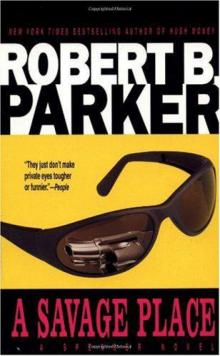 A Savage Place s-8
A Savage Place s-8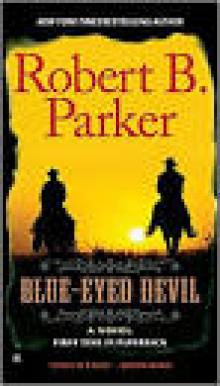 Appaloosa / Resolution / Brimstone / Blue-Eyed Devil
Appaloosa / Resolution / Brimstone / Blue-Eyed Devil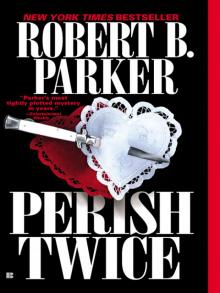 Perish Twice
Perish Twice Spare Change
Spare Change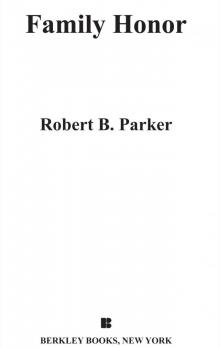 Family Honor
Family Honor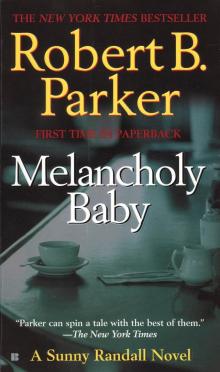 Melancholy Baby
Melancholy Baby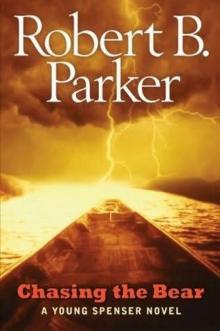 Chasing the Bear
Chasing the Bear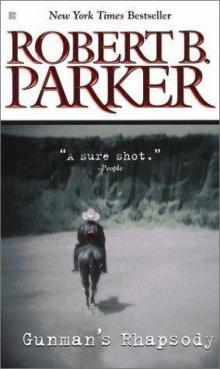 Gunman's Rhapsody
Gunman's Rhapsody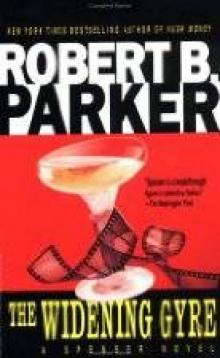 The Widening Gyre
The Widening Gyre Thin Air
Thin Air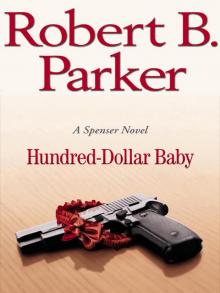 Hundred-Dollar Baby
Hundred-Dollar Baby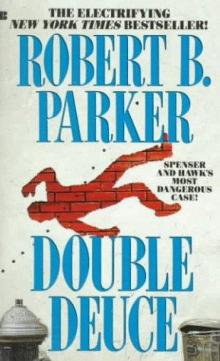 Double Deuce s-19
Double Deuce s-19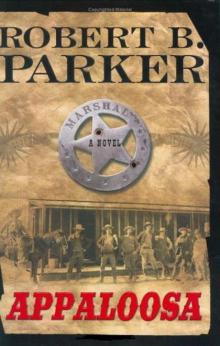 Appaloosa vcaeh-1
Appaloosa vcaeh-1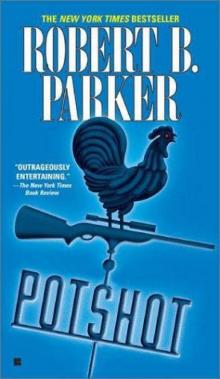 Potshot
Potshot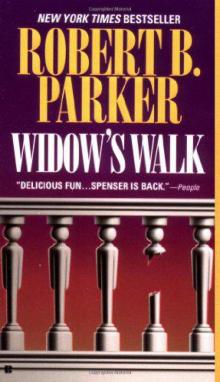 Widow’s Walk s-29
Widow’s Walk s-29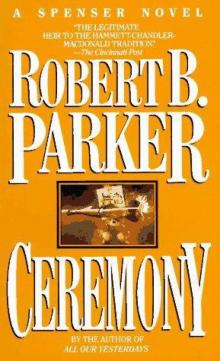 Ceremony s-9
Ceremony s-9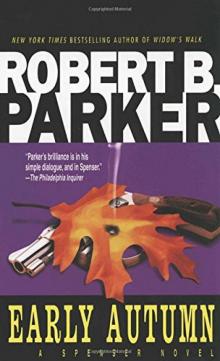 Early Autumn
Early Autumn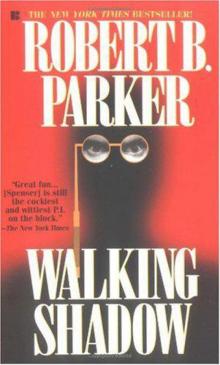 Walking Shadow s-21
Walking Shadow s-21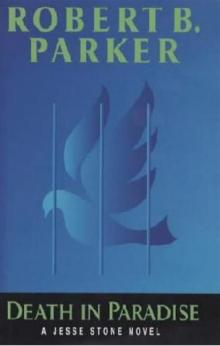 Death In Paradise js-3
Death In Paradise js-3 Shrink Rap
Shrink Rap Blue-Eyed Devil
Blue-Eyed Devil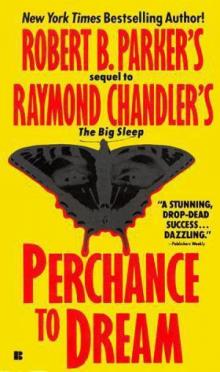 Perchance to Dream
Perchance to Dream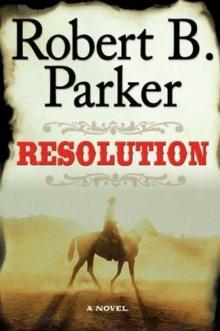 Resolution vcaeh-2
Resolution vcaeh-2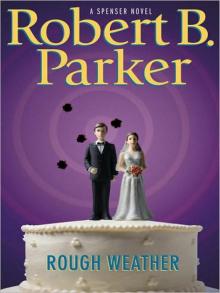 Rough Weather
Rough Weather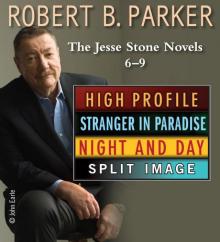 The Jesse Stone Novels 6-9
The Jesse Stone Novels 6-9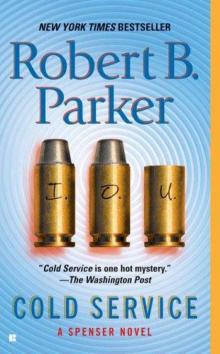 Cold Service s-32
Cold Service s-32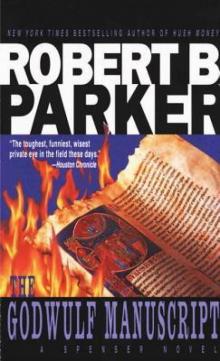 The Godwulf Manuscript
The Godwulf Manuscript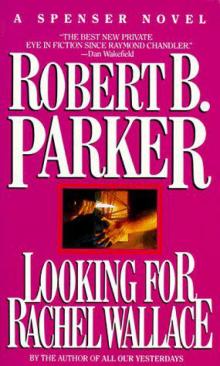 Looking for Rachel Wallace s-6
Looking for Rachel Wallace s-6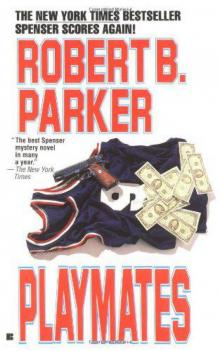 Playmates s-16
Playmates s-16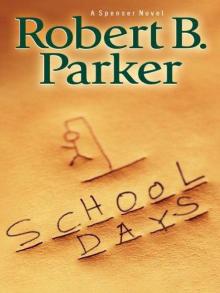 School Days s-33
School Days s-33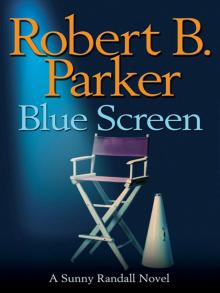 Blue Screen
Blue Screen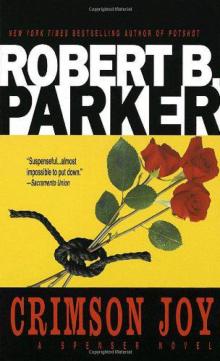 Crimson Joy
Crimson Joy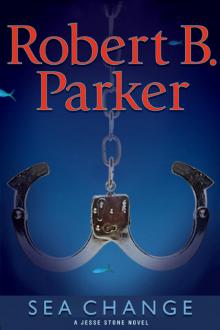 Sea Change js-5
Sea Change js-5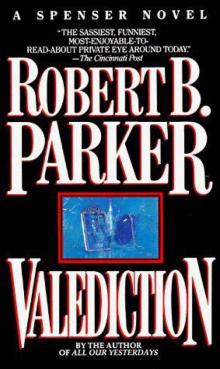 Valediction s-11
Valediction s-11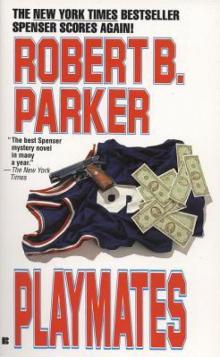 Playmates
Playmates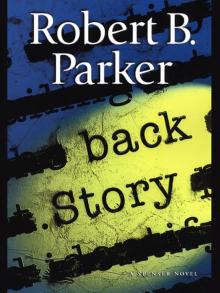 Back Story
Back Story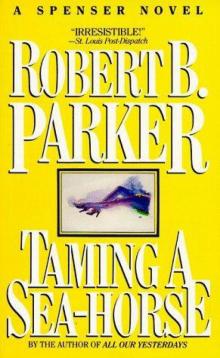 Taming a Sea Horse
Taming a Sea Horse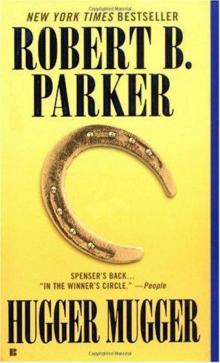 Hugger Mugger
Hugger Mugger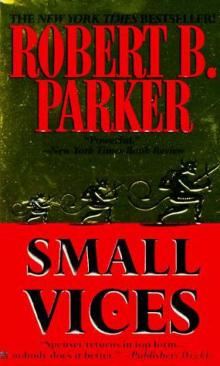 Small Vices s-24
Small Vices s-24 Silent Night: A Spenser Holiday Novel
Silent Night: A Spenser Holiday Novel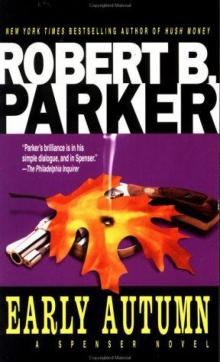 Early Autumn s-7
Early Autumn s-7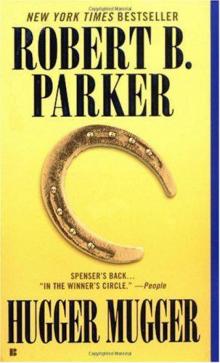 Hugger Mugger s-27
Hugger Mugger s-27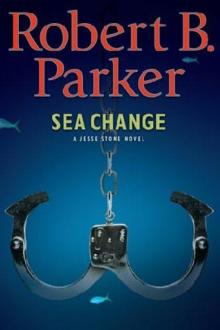 (5/10) Sea Change
(5/10) Sea Change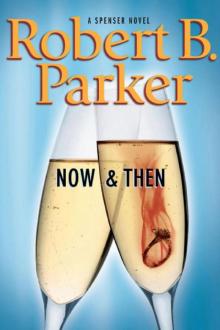 Now and Then
Now and Then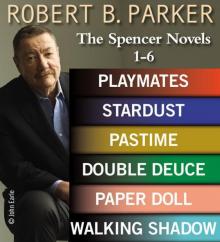 Robert B. Parker: The Spencer Novels 1?6
Robert B. Parker: The Spencer Novels 1?6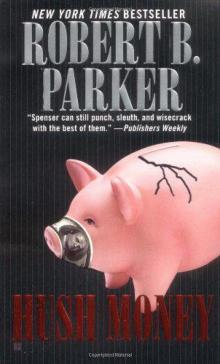 Hush Money s-26
Hush Money s-26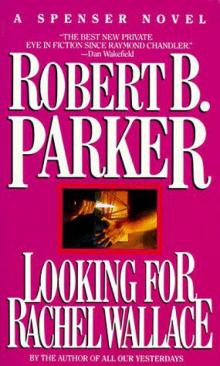 Looking for Rachel Wallace
Looking for Rachel Wallace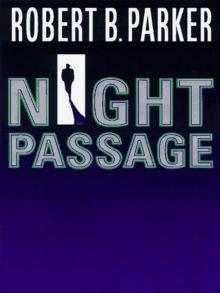 Night Passage
Night Passage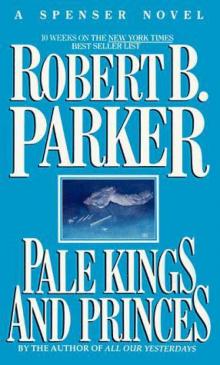 Pale Kings and Princes
Pale Kings and Princes All Our Yesterdays
All Our Yesterdays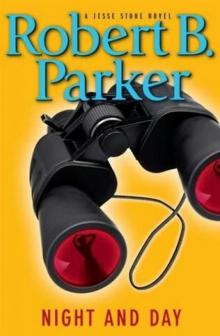 Night and Day js-8
Night and Day js-8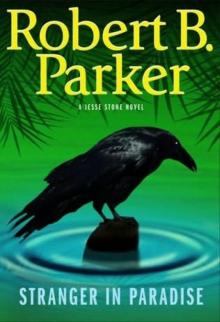 Stranger in Paradise js-7
Stranger in Paradise js-7 Double Play
Double Play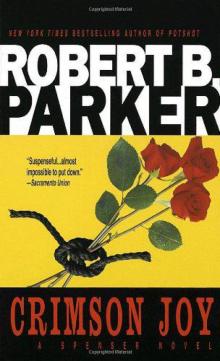 Crimson Joy s-15
Crimson Joy s-15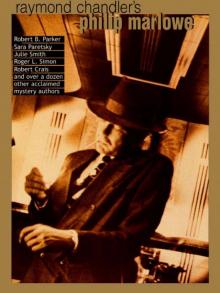 Raymond Chandler's Philip Marlowe
Raymond Chandler's Philip Marlowe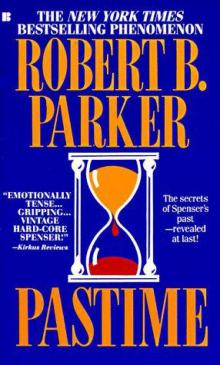 Pastime
Pastime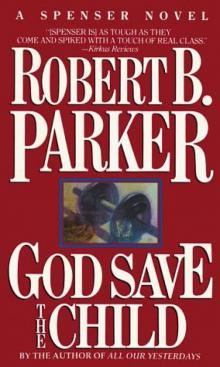 God Save the Child s-2
God Save the Child s-2 Bad Business
Bad Business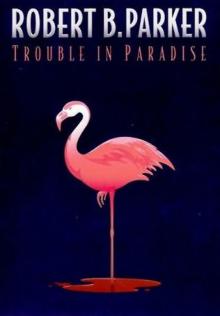 Trouble in Paradise js-2
Trouble in Paradise js-2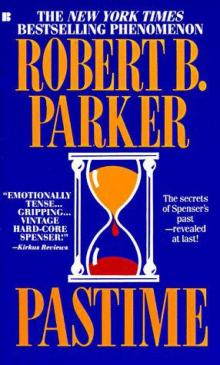 Pastime s-18
Pastime s-18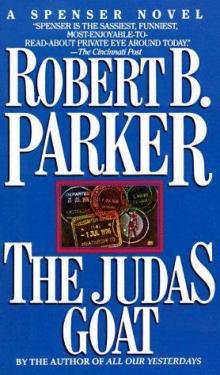 The Judas Goat s-5
The Judas Goat s-5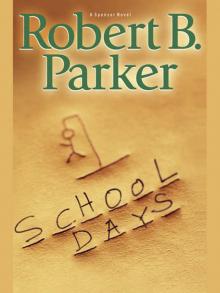 School Days
School Days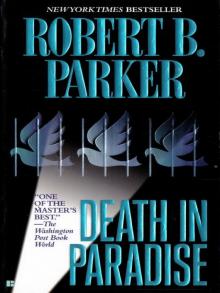 Death In Paradise
Death In Paradise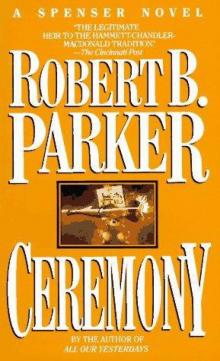 Ceremony
Ceremony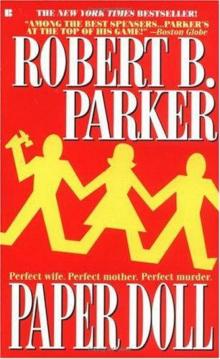 Paper Doll s-20
Paper Doll s-20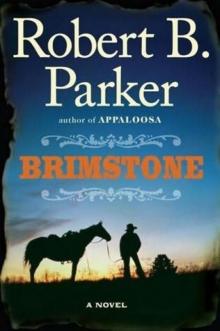 Brimstone vcaeh-3
Brimstone vcaeh-3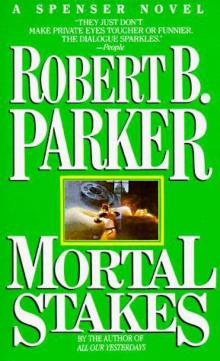 Mortal Stakes s-3
Mortal Stakes s-3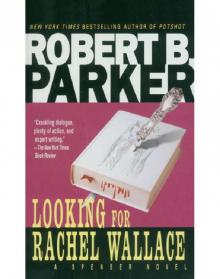 Spencer 06 - Looking for Rachel Wallace
Spencer 06 - Looking for Rachel Wallace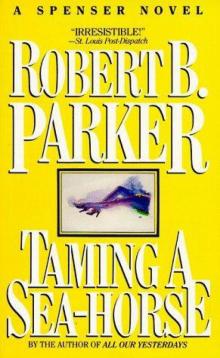 Taming a Sea Horse s-13
Taming a Sea Horse s-13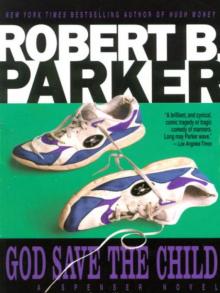 God Save the Child
God Save the Child Chance
Chance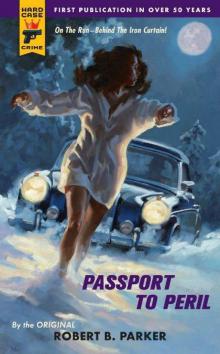 Passport To Peril hcc-57
Passport To Peril hcc-57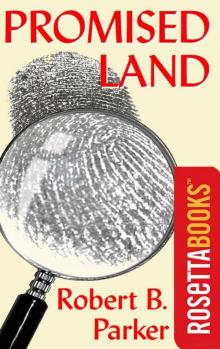 Promised Land
Promised Land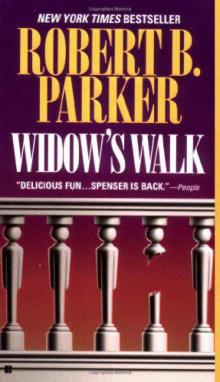 Widow’s Walk
Widow’s Walk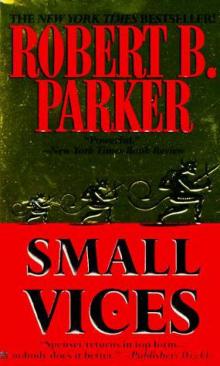 Small Vices
Small Vices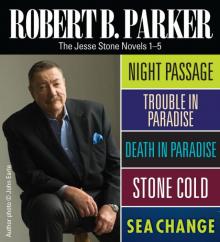 Robert B Parker: The Jesse Stone Novels 1-5
Robert B Parker: The Jesse Stone Novels 1-5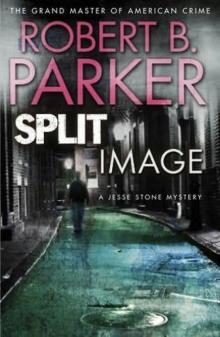 Split Image js-9
Split Image js-9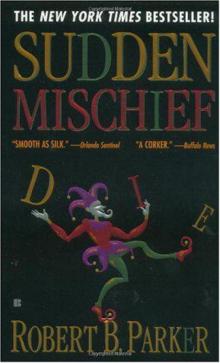 Sudden Mischief s-25
Sudden Mischief s-25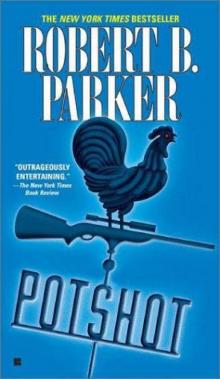 Potshot s-28
Potshot s-28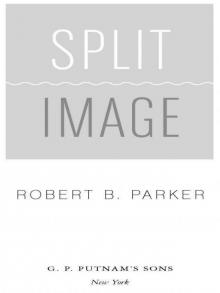 Split Image
Split Image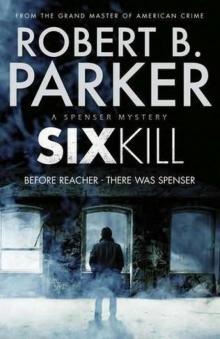 Sixkill s-40
Sixkill s-40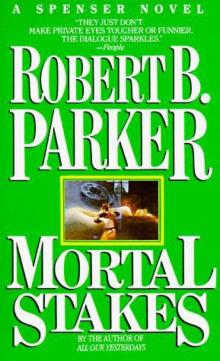 Mortal Stakes
Mortal Stakes Stardust
Stardust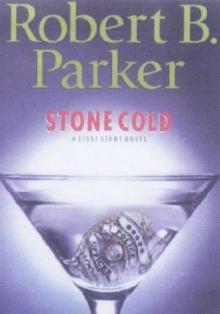 Stone Cold js-4
Stone Cold js-4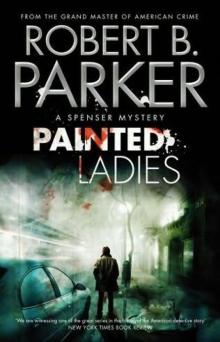 Painted Ladies s-39
Painted Ladies s-39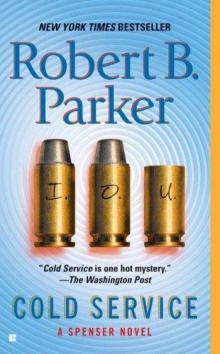 Cold Service
Cold Service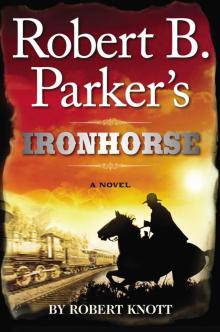 Ironhorse
Ironhorse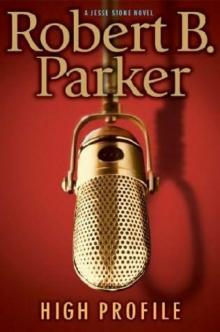 High Profile js-6
High Profile js-6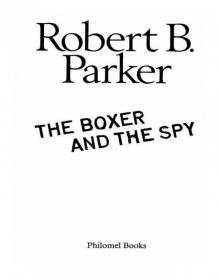 The Boxer and the Spy
The Boxer and the Spy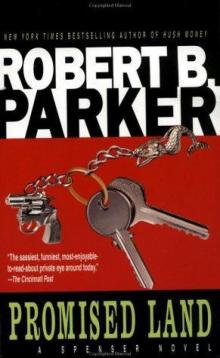 Promised Land s-4
Promised Land s-4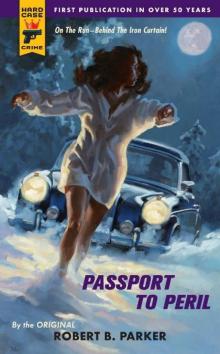 Passport to Peril (Hard Case Crime (Mass Market Paperback))
Passport to Peril (Hard Case Crime (Mass Market Paperback))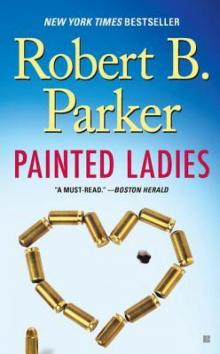 Painted Ladies
Painted Ladies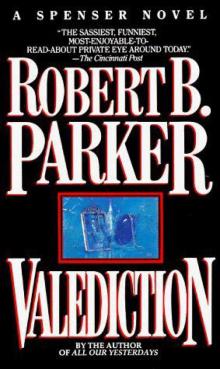 Valediction
Valediction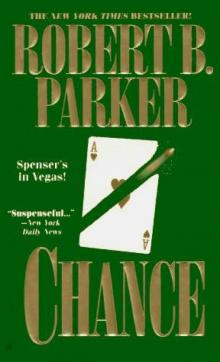 Chance s-23
Chance s-23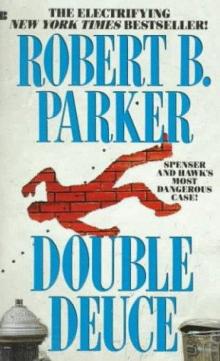 Double Deuce
Double Deuce Wilderness
Wilderness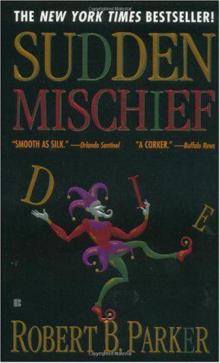 Sudden Mischief
Sudden Mischief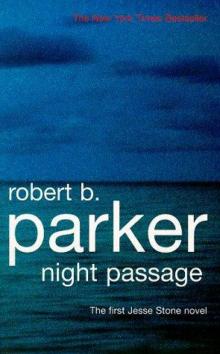 Night Passage js-1
Night Passage js-1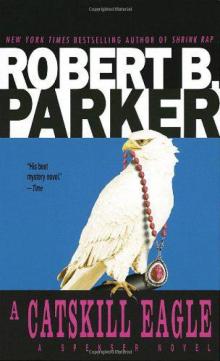 A Catskill Eagle
A Catskill Eagle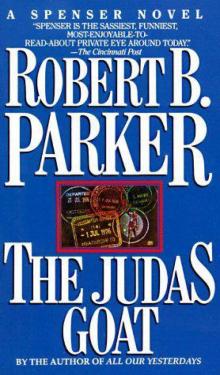 The Judas Goat
The Judas Goat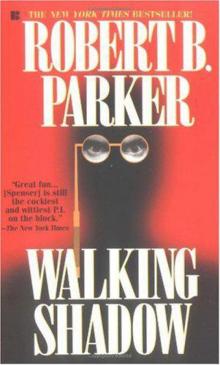 Walking Shadow
Walking Shadow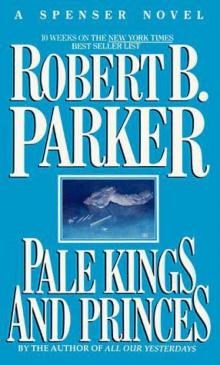 Pale Kings and Princes s-14
Pale Kings and Princes s-14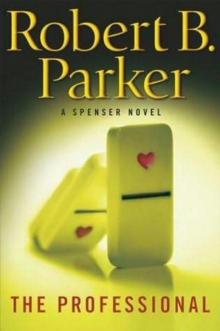 The Professional
The Professional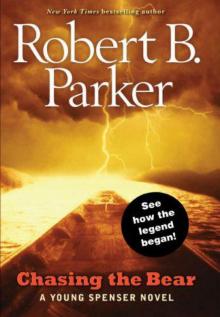 Chasing the Bear s-37
Chasing the Bear s-37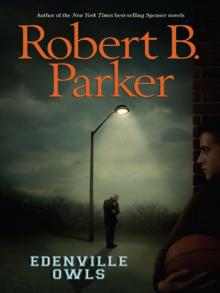 Edenville Owls
Edenville Owls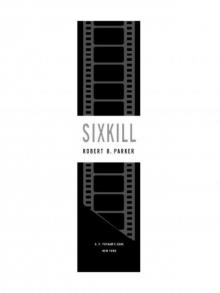 Sixkill
Sixkill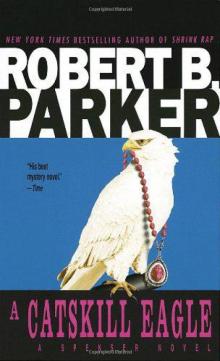 A Catskill Eagle s-12
A Catskill Eagle s-12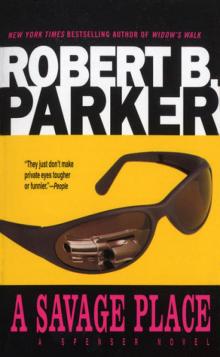 A Savage Place
A Savage Place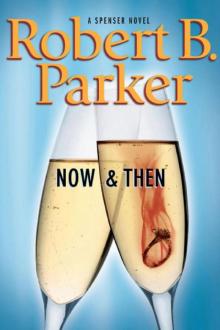 Now and Then s-35
Now and Then s-35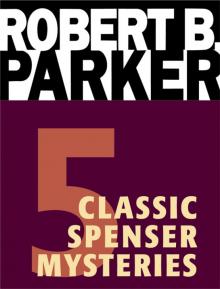 Five Classic Spenser Mysteries
Five Classic Spenser Mysteries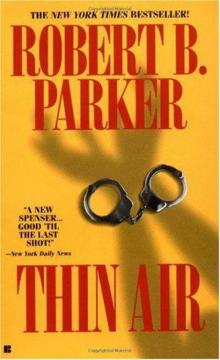 Thin Air s-22
Thin Air s-22